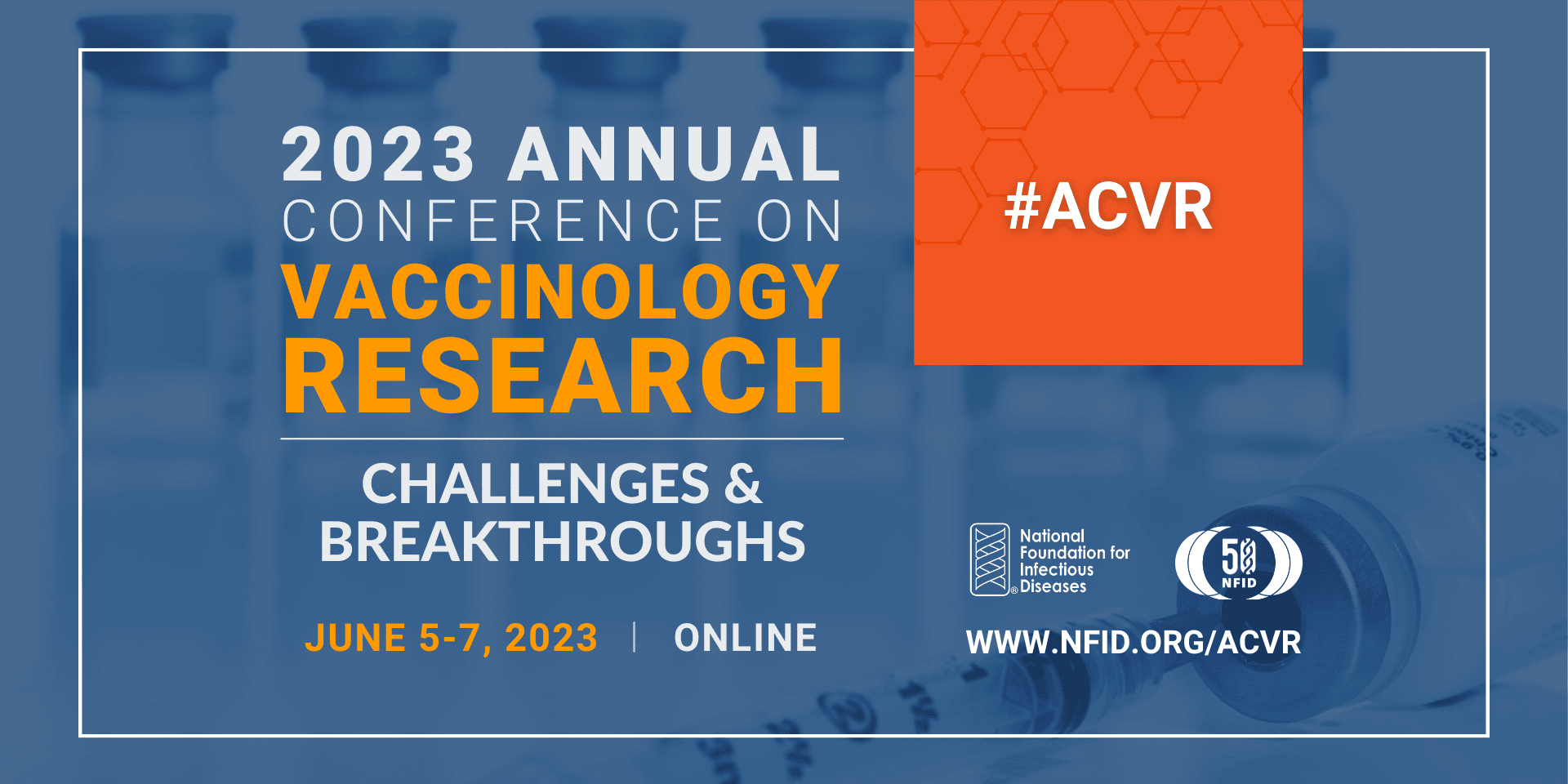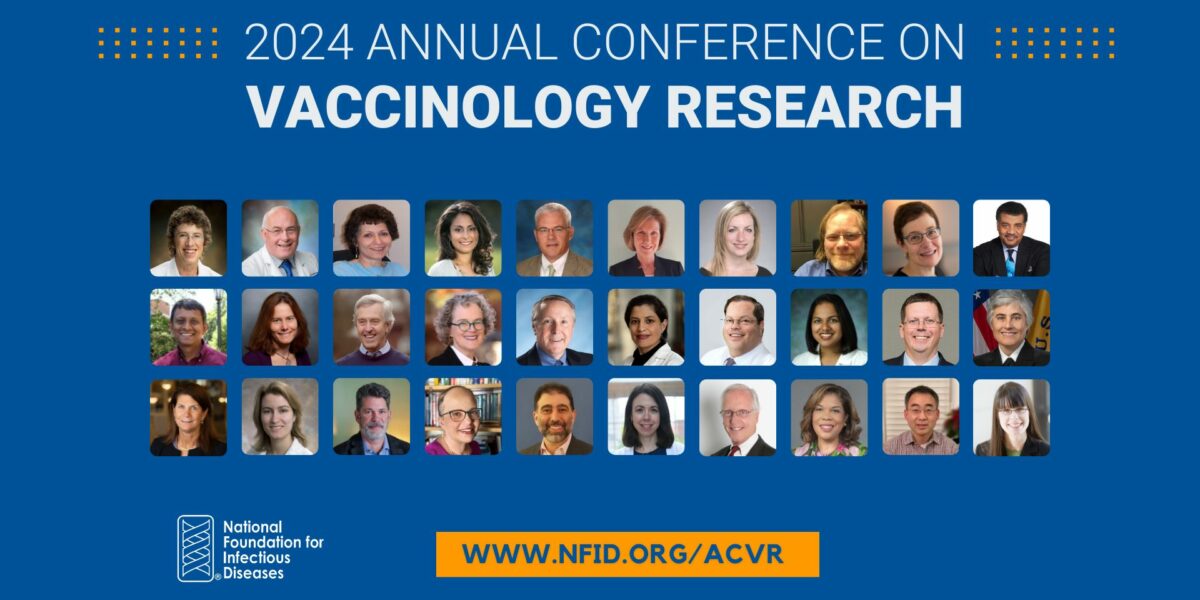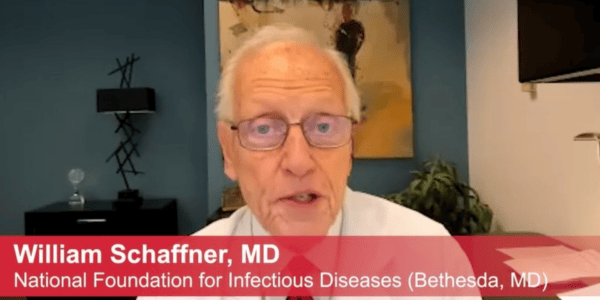
The 2023 Annual Conference on Vaccinology Research (ACVR), hosted by the National Foundation for Infectious Diseases (NFID), featured new scientific findings on COVID-19, respiratory syncytial virus (RSV), influenza, dengue, malaria, and other diseases, as decades of research are now paying off in the form of breakthrough innovations in disease prevention and treatment.
In this interview with Consultant 360, NFID Medical Director William Schaffner, MD, reviews some of the conference highlights:
Vaccinology is the science and engineering of developing vaccines to prevent infectious diseases. But, as NFID Past President Walter A. Orenstein, MD, often notes, “Vaccines don’t save lives, vaccination does.”
-NFID Medical Director William Schaffner, MD
Additional Highlights from 2023 ACVR
Oral abstracts featured research on new vaccines for herpes zoster (shingles) and Shigella bacteria, as well as strategies for improving enrollment and representation in clinical trials for vaccines. Other research studies presented underscored the role of healthcare professionals in correcting vaccine misinformation, improving public trust in vaccines, and improving overall vaccination rates.
Mary Lou Clements-Mann Memorial Lecture in Vaccine Sciences: Barney S. Graham, MD, PhD; Morehouse School of Medicine:
 Decades of basic, scientific research to develop vaccines for HIV and other pathogens helped pave the way for the rapid development of vaccines for COVID-19. When a new challenge arose, we were ready to address it with vaccines that are remarkably effective and remarkably safe … mRNA technology is making a significant difference in developing new vaccines for pathogens such as cytomegalovirus (CMV) and RSV, but mRNA is not magic—antigen design is critical … Broadly neutralizing antibodies have implications for a universal influenza vaccine—a super-seasonal vaccine that would protect against multiple strains and could be given every few years. Scientists are hoping to make something that is already very good—current influenza vaccines—even better. There is guarded optimism that a universal flu vaccine could lead to greater acceptance by the population. Because it would work against multiple strains, the vaccine could be given at any time (not just during fall flu campaigns), which would also make vaccination easier to implement.
Decades of basic, scientific research to develop vaccines for HIV and other pathogens helped pave the way for the rapid development of vaccines for COVID-19. When a new challenge arose, we were ready to address it with vaccines that are remarkably effective and remarkably safe … mRNA technology is making a significant difference in developing new vaccines for pathogens such as cytomegalovirus (CMV) and RSV, but mRNA is not magic—antigen design is critical … Broadly neutralizing antibodies have implications for a universal influenza vaccine—a super-seasonal vaccine that would protect against multiple strains and could be given every few years. Scientists are hoping to make something that is already very good—current influenza vaccines—even better. There is guarded optimism that a universal flu vaccine could lead to greater acceptance by the population. Because it would work against multiple strains, the vaccine could be given at any time (not just during fall flu campaigns), which would also make vaccination easier to implement.
RSV Challenges and Breakthroughs:
Christopher J. Gill, MD, MS, Boston University School of Public Health: The more complicated we make it to use new RSV tools, the more likely people will be missed. There is a tradeoff between affordability and simplicity. Implementation science is important.
Heidi Moline, MD, MPH, Centers for Disease Control and Prevention: New RSV prevention tools, including vaccines and monoclonal antibodies, present unique timing and dosing considerations, with continued surveillance needed to guide recommendations.
Angela R. Branche, MD, University of Rochester Medical Center: The 2023-2024 respiratory season will be challenging, with three vaccines being recommended simultaneously: flu, COVID-19, and RSV. It will be a heavy lift over the next couple of seasons, but there is reason to be optimistic.
Women Leaders in Vaccinology Panel Discussion:

The always popular, inspiring, and interactive panel discussion moderated by NFID Vice President Kathleen M. Neuzil, MD, MPH, University of Maryland School of Medicine, featured influential women leaders in vaccinology, working in a various professional settings, sharing personal stories and lessons learned throughout their careers:
Donna Ambrosino, MD, Ambrosino Biotech Consulting: Practical decisions matter (e.g., choose where to live for the shortest possible commute) … Learn to say no wisely … Ask for a promotion, ask for a raise—to allow you the freedom to succeed.
Maria Bottazzi, PhD, Baylor College of Medicine: Learn how to communicate and engage—it will give you the confidence to speak up for yourself … Be intentional and treat self-care/family connections as part of your job (set appointments in your calendar if necessary).
NFID Director Julie Morita, MD, Robert Wood Johnson Foundation: Community is important in overcoming imposter syndrome … Maintain relationships with family/friends that can fill the gaps when you are stressed and need support.
Georgina Peacock, MD, MPH, Immunization Services Division, Centers for Disease Control and Prevention: Form social connections with women to create a network that can help you in the workplace … Go home early and spend time with family (log in later at night as needed) … Serve as a role model—let junior women know you are leaving work to be with family … Be intentional about learning from others (have regular check-ins with counterparts).
How you define balance is different during different times of your life. Resolve to say no at least 3 times a week.
-NFID Vice President Kathleen M. Neuzil, MD, MPH
The Next 50 Years in Vaccinology—Looking Back and Moving Forward:

The closing session, a panel discussion moderated by ACVR Planning Committee member, Bruce G. Gellin, MD, The Rockefeller Foundation, addressed prioritizing future investments to better understand respiratory viruses and the use of mucosal immune response to prevent infection, synthetic biology (e.g., mRNA), maternal immunization, artificial intelligence, and training and communication (early education of children to understand and appreciate the value of vaccination):
Galit Alter, PhD, Moderna: Immunological marvels have allowed the development of new conjugate vaccines, vector vaccines, and other technologies. The last part of the puzzle is understanding the host immune response (when we need to boost and who is most vulnerable) and bringing this knowledge into new vaccine design.
Alejandro Cravioto, MD, PhD, National Autonomous University of Mexico: Core principals are equity, access (cost/distribution), and simplicity (well-designed programs on how products should be stored, used, and offered) … Public-private partnerships are needed to invest in research and development of new vaccine platforms to make vaccines available globally … Personalized vaccinology will create the need to re-evaluate existing immunization schedules.
Philip R. Dormitzer, MD, PhD, GSK Vaccine Research and Development: There will be another pandemic, but we may not have a target as highly susceptible to immunization as COVID-19 … mRNA vaccines will play an important role, but we need to make vaccines that are better tolerated by all … Future trends may include new combination vaccines for older adults and adolescents, and vaccines to address immunotherapy, allergies, and autoimmunity … Being able to assess individual susceptibilities could help us address perceptions about the benefits of vaccination. Showing serological evidence of impact may help with addressing vaccine hesitancy (beyond just a sore arm).
Kathryn M. Edwards, MD, Vanderbilt University Medical Center: In the past 50 years, new vaccines have helped protect against bacterial meningitis, influenza, and pneumococcal disease. Incredible imaging technology and diagnostics (PCR) have enabled better patient care … The next 50 years will be even more productive, but the promise of vaccines is being threatened by hesitancy and misinformation … We must use our best science to understand rare, serious adverse events: Are they specific to the individual? How can we apply new science to vaccine safety?
To join the conversation and get the latest news on infectious diseases, follow NFID on Twitter using the hashtag #ACVR, like us on Facebook, follow us on Instagram, visit us on LinkedIn, listen and subscribe to the Infectious IDeas podcast, and subscribe to receive future NFID Updates.
Related Posts

Women Leaders Shaping the Future of Public Health
Trailblazing women leaders share invaluable lessons, urging the next generation of scientists and public health advocates to take risks, stay curious, and make a difference

Preparing for the Future of Vaccinology
With an overall theme of preparing for the future, the 2024 Annual Conference on Vaccinology Research featured the latest scientific advances to prevent and manage infectious diseases, including respiratory, vector-borne, and other emerging and re-emerging diseases

Inspiring Stories of Impact in Vaccinology
Vaccinology is about more than just scientific breakthroughs—it is about lives transformed, communities protected, and futures secured. For some, it is a moment of realization that a career can be as fulfilling as it is impactful …

